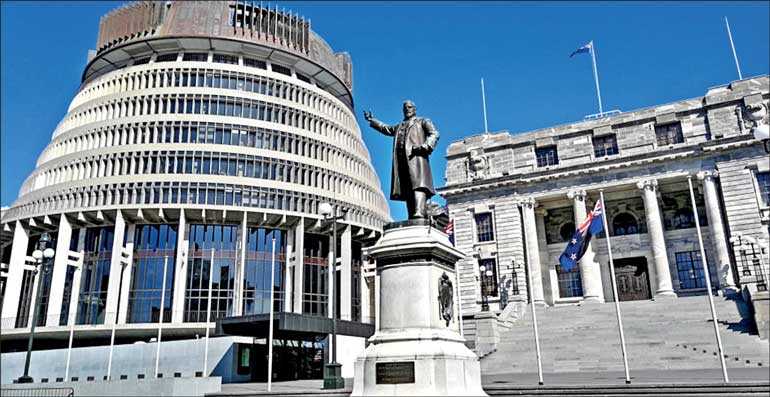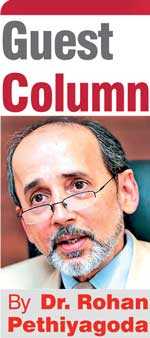Monday Feb 16, 2026
Monday Feb 16, 2026
Thursday, 30 April 2020 00:00 - - {{hitsCtrl.values.hits}}

The incubation time of the coronavirus is less than two weeks, and most people who develop symptoms are infective for less than two weeks after that. So now, after six weeks of curfew, the virus should be extinct in Sri Lanka. But it isn’t. On the contrary, it looks set to stay and work its way through the  community. Our strategy at the beginning was designed for a 100-metre sprint to the finish line. Now it is clear that what we are running is a 42-kilometre marathon. This thing is going to be with us for another year, maybe longer. We need to learn to live with it.
community. Our strategy at the beginning was designed for a 100-metre sprint to the finish line. Now it is clear that what we are running is a 42-kilometre marathon. This thing is going to be with us for another year, maybe longer. We need to learn to live with it.
As an island with no passenger traffic from the outside, Sri Lanka can, in principle, eradicate the virus. As islands, Australia and New Zealand are now on the verge of doing so even though, to start with, they had more cases than we did. And they didn’t even impose curfews. But it didn’t work here, and rather than flog a dead horse or point accusing fingers, we should now think of Plan B.
The big difference between our strategy and those countries who are succeeding in combating this disease is that the healthcare authorities got the people on their side. In Sri Lanka, however, by sections of the media and even some Government agencies naming, shaming, victimising and criminalising those infected by the virus, we succeeded only in driving it underground. It is not too late to rethink this strategy. If people with symptoms are assured of humane treatment, they are much more likely to come forward to be tested and treated, and to identify their contacts for isolation.
Our export trade will be severely diminished, and export-commodity prices will fall. The tourism industry has no prospect of recovery this year. No cinemas, no large weddings, and only the sparsest restaurants. Add to this Middle East returnees, and we are looking at around 2 million unemployed. The urgency is to get back to work. Remember, governments only SPEND money: they don’t earn it. Government revenue comes from taxes on private sector income, profits and turnover. When that dries up, we can only pray for charity. And since the whole world is in this crisis, there’s little charity going round. So, unless the private sector gets back to work soon, everybody starves. The endless curfew is simply not economically sustainable.
So, on the basis that this is a marathon and not a sprint, here are some things we could consider:
1. Open primary schools. Worldwide data shows that the virus to poses almost no threat to under-12s. They should resume their disrupted education now.
2. Open secondary schools six days a week, with each pupil attending on alternate days. While using the NIC as a curfew pass has been an excellent innovation, this will not work for schools because siblings need to attend on the same days. Therefore, children can be divided into groups, for example alphabetically by surname.
3. Allow private hospitals and labs, and university molecular-biology labs, to begin private PCR testing, under standards set by NMRA. Private sector employers will happily pay for their staff to be regularly tested. Such labs can also be established in free trade zones, independently funded by FTZ businesses. Why is testing a Government monopoly? So long as tests conform to a national standard, the more the merrier. And that reduces pressure on the Government’s infrastructure.
4. Cancel all public holidays except the most important. As a nation, we need to get back to work and restart the economy. Factories, offices and shops must be allowed to open on any day, and any hours, on a shift basis, subject to social distancing rules. Imperfect working conditions are better than the alternative: mass unemployment.
5. Encourage shops, pharmacies and supermarkets to remain open 7-11 to minimise crowding.
6. Publicly identify the highest risk group: those over 60, and those with conditions such as diabetes, HIV and renal failure, or undergoing chemotherapy or radiotherapy. They must remain isolated. Everyone else should be encouraged to get on with their lives, while abiding by the distancing and sanitation guidelines already announced.
7. Stop cremation of victims’ bodies and allow funerals to take place. Forcible cremation only alarms the public. Don’t make the same mistake governments made during the HIV epidemic in the 1990s. There is no risk to the community from the body of someone who has died from coronavirus, as every other country has found. Funeral undertakers could be given regulations on how funerals can be performed safely, and funerals could be limited to spouse, siblings, parents and children only.
8. Although universities have already begun online lectures, they should be allowed to reopen key faculties such as Medicine, subject to distancing guidelines. The freed-up hostel capacity will allow lower densities in university accommodation and reduce risk. Besides, every medical faculty already has facilities to PCR test its staff and students.
Finally, allow the Health Ministry to do its job. Sri Lanka has the finest public healthcare system in South Asia. The Ministry delivers some of the best public-health outcomes in the world, from infant and maternal mortality, through immunisation, to life expectancy. It is the Ministry that managed the HIV epidemic in the 1990s and eradicated malaria from the country in 2015. Its community-health physicians, virologists, microbiologists and immunologists are among the best in the world. Yet, at the outset of this crisis in March, the Health Ministry was elbowed out of the way by the GMOA (a union, not even a professional association) and others with no experience in public health policy, who hogged the airtime and took charge. No doubt they hoped to impress the Government by showing that it was they who solved the problem. Now that it is clear they failed, they have started pointing fingers at the Ministry of Health. Even now, the Government should make it the Ministry’s mandate to take leadership in managing this crisis. Only they have the expertise.
Based on the experience of other countries, the population-level mortality from this virus looks like around 0.5%. But remember that 0.7% of the population dies anyway every year, and begging pardon for a lack of subtlety, many COVID-19 deaths will overlap with those of us who are billed to die this year anyway.
Belt up, Sri Lanka. This is going to be a long, bumpy ride. But by restarting the economy sooner than later, most of us, and especially the young generation, have a prospect of a brighter future. Unless we bite the bullet and do this, we are looking at mass unemployment, mass poverty and mass misery. So, let’s get back to work: gradually and responsibly. Otherwise, when this is over, life won’t be worth living for many Sri Lankans.